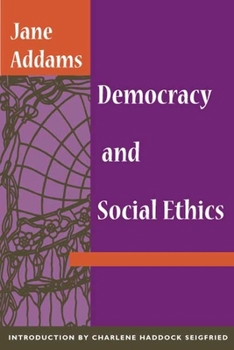Democracy and Social Ethics
Select Format
Select Condition 
Book Overview
Nearly a century before the advent of "multiculturalism," Jane Addams put forward her conception of the moral significance of diversity. Each member of a democracy, Addams believed, is under a moral obligation to seek out diverse experiences, making a daily effort to confront others' perspectives. Morality must be seen as a social rather than an individual endeavor, and democracy as a way of life rather than merely a basis for laws. Failing this, both democracy and ethics remain sterile, empty concepts.
In this, Addams's earliest book on ethics--presented here with a substantial introduction by Charlene Haddock Seigfried--she reflects on the factors that hinder the ability of all members of society to determine their own well-being. Observing relationships between charitable workers and their clients, between factory owners and their employers, and between household employers and their servants, she identifies sources of friction and shows how conceiving of democracy as a social obligation can lead to new, mutually beneficial lines of conduct. She also considers the proper education of workers, struggles between parents and their adult daughters over conflicting family and social claims, and the merging of politics with the daily lives of constituents.
"The sphere of morals is the sphere of action," Addams proclaims. It is not enough to believe passively in the innate dignity of all human beings. Rather, one must work daily to root out racial, gender, class, and other prejudices from personal relationships.
In this, Addams's earliest book on ethics--presented here with a substantial introduction by Charlene Haddock Seigfried--she reflects on the factors that hinder the ability of all members of society to determine their own well-being. Observing relationships between charitable workers and their clients, between factory owners and their employers, and between household employers and their servants, she identifies sources of friction and shows how conceiving of democracy as a social obligation can lead to new, mutually beneficial lines of conduct. She also considers the proper education of workers, struggles between parents and their adult daughters over conflicting family and social claims, and the merging of politics with the daily lives of constituents.
"The sphere of morals is the sphere of action," Addams proclaims. It is not enough to believe passively in the innate dignity of all human beings. Rather, one must work daily to root out racial, gender, class, and other prejudices from personal relationships.
Format:Paperback
Language:English
ISBN:0252070232
ISBN13:9780252070235
Release Date:November 2001
Publisher:University of Illinois Press
Length:168 Pages
Weight:0.52 lbs.
Dimensions:0.5" x 5.4" x 8.3"
Customer Reviews
1 rating
An Empathetic Look At the Plight of Early 20th Century Poverty-Stricken Immigrants
Published by Thriftbooks.com User , 17 years ago
Hull House founder and Nobel Peace Prize winner Jane Addams spent twenty years working with the poverty-stricken immigrant poor in Chicago. She writes here with understated passion and unqualified empathy for their plight. Anyone who wants to know why we have a fourty hour work should read this book. Addams writes about the desirablity of factory work over household work for young women, due both to the lack of isolation and the relatively short working hours, "only" from 7 a.m. to 6 p.m., six days a week. Anyone who wants to know why we minimum wage laws, social security disability laws, age discrimination laws, social security laws, welfare laws, etc. should read this book. Addams writes about people earning pennies an hour, having their peak earning years in their twenties, being disabled in their thirties, and being dependent on children for financial support. The children, in turn had their education stop before high school so they can support their families. Anyone who wants to know why governments spend so much money on education should read this book. Addams writes about children having a choose limited to factory employment or household service, with the more intellectually oriented being doomed to spend a lifetime haunting public libraries and public lectures, but having virtually no chance of escaping the circumstance of their birth. Anyone who wants to know why poverty-stricken people are suspicious of political reform movements should read this book. Addams writes about the major efforts Chicago's political powerhouses made to help individual poverty-stricken people, and the irrelevance of wisdom advocating personal savings to people who could not pay for food for their family, or of wisdom urging them to stay out of taverns when they were a great source of personal help and friendship. One hundred and five years after Addams wrote this book, the United States is a far better place to live than it was then. But our country's improvements, urged by great progressive leaders like Addams, are under relentless right-wing assaults today. This book is extremely relevant to our country's future, if our future is going to continue to better than our past. The introduction of Charlene Haddock Seigfried, the past president of the Society for the Advancement of American philosophy, adds a great deal to this work, as it places Addams and her fellow reformers into the context of both their times and the prevailing systems of thought. Addams saw democracy as a way of life, and not just a series of electoral choices. She sought a major expansion of municipal services, to both improve the living standards of the desperately poor and to wean them away from dependence on corrupt political machines. She advocated the existence of "A reformer who really knew the people and their great human needs, who believed it was the business of government to serve them, and who further recognized the educative power of a sense of responsibility....





